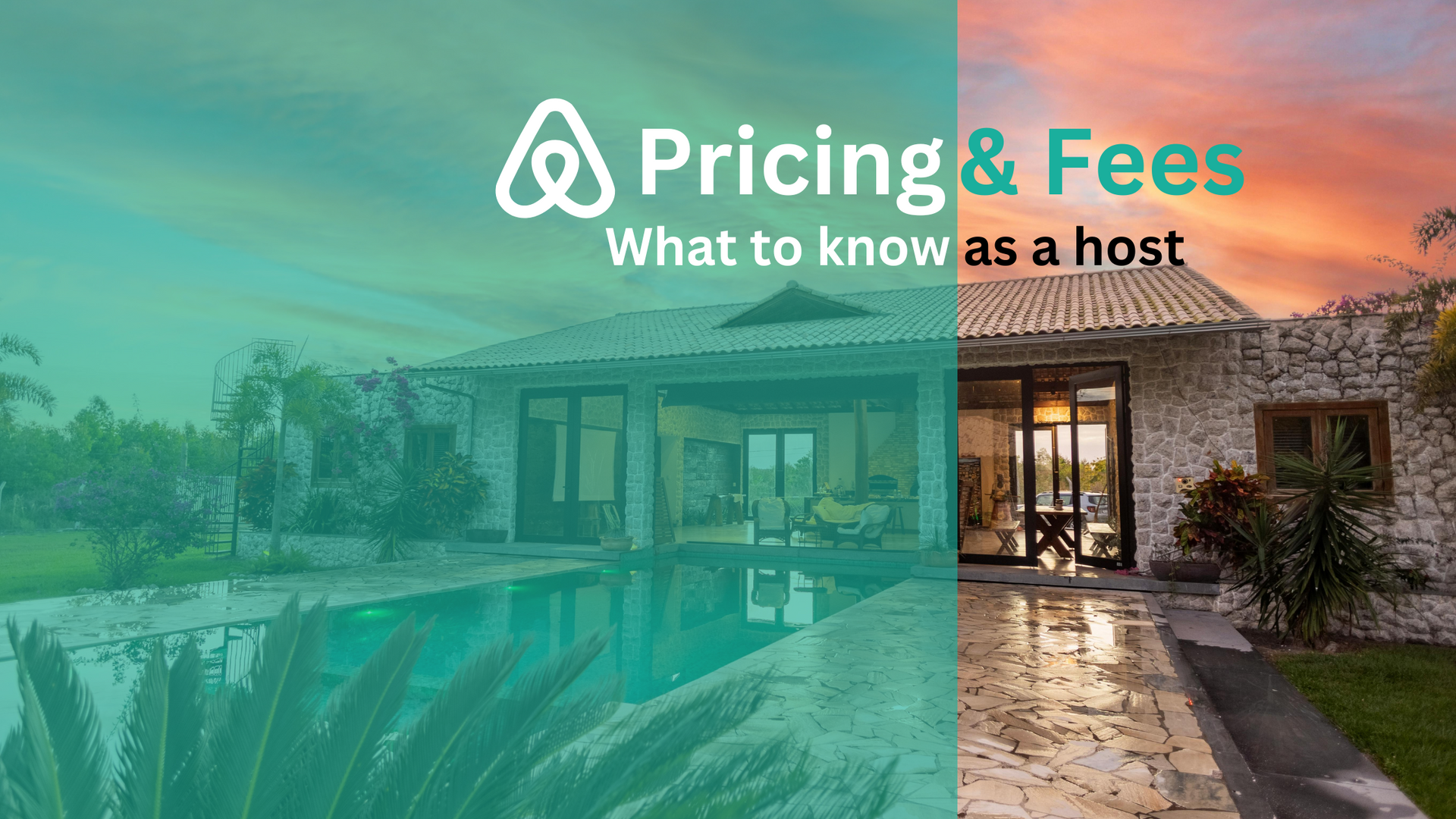How Much Does Airbnb Take? A Quick Guide for Hosts

Quick Answer: Airbnb takes 3% to 16% of the booking subtotal depending on the fee model, with hosts paying 3% under the split-fee model or 14-16% under the host-only model.
How Much Does Airbnb Take? A Quick Guide for Hosts
Airbnb is one of the most popular platforms for short-term rentals, but its fee structure often leaves hosts wondering how much does Airbnb take and how much they’re truly earning from each booking.
Whether you’re a new host or an experienced one, understanding these fees is crucial to managing your profitability. This guide explains how Airbnb’s fees work, the differences between its fee models, and strategies for hosts to handle these costs effectively.
How Airbnb Fees Work
The Split-Fee Model
In the split-fee model, Airbnb deducts 3% of the booking subtotal from the host’s payout. The guest pays a separate service fee, typically 12-20%, depending on factors like the booking total and currency. This model is the default for most individual hosts.
However, this approach has faced criticism from guests due to the at-checkout price jump. While the initial price displayed during the search process seems affordable, the addition of guest service fees at checkout often results in a significantly higher total. This unexpected jump can frustrate guests, leading to abandoned bookings and a less favorable experience.
The Host-Only Fee Model
In contrast, the host-only fee model shifts the entire service fee to the host. Instead of 3%, Airbnb takes 14-16% from the host’s earnings. Guests see an all-inclusive price upfront, with no added fees during checkout. By eliminating the surprise fees, this model enhances the booking experience, making listings more transparent and appealing.
Hosts benefit indirectly as well, with Airbnb reporting a 17% increase in bookings for those who adopted the host-only fee structure during testing. The simplified pricing ensures that the price guests see during their search matches what they pay, reducing confusion and increasing trust.
Recent Changes to Airbnb’s Fee Structure
In 2020, Airbnb introduced the simplified pricing model, which is another term for the host-only fee structure. Under this model, the entire service fee—typically 14-16% of the booking subtotal—is paid by the host, while guests see an all-inclusive price with no separate service fees at checkout. The change was designed to enhance transparency for guests and align Airbnb’s practices with platforms like Booking.com.
Airbnb reported that hosts who adopted the simplified pricing model during its testing phase experienced a 17% increase in bookings, largely due to the elimination of surprise fees at checkout, which made listings more appealing to potential guests.
This fee structure is mandatory for:
- Hosts using third-party software like Hostaway or Guesty.
- Certain property types, such as serviced apartments.
However, hosts in the United States, Canada, and some other regions still have the option to continue using the split-fee model, where a smaller percentage (3%) is deducted from the host and the remainder is covered by a separate guest service fee.
By default, Airbnb encourages hosts to switch to the simplified pricing model, emphasizing its potential to increase bookings by offering guests greater price clarity.
Why Airbnb’s Fee Structure Matters
Understanding how Airbnb’s fees impact both hosts and guests is crucial for setting the right pricing strategy. Beyond just numbers, these fees influence guest perceptions, booking decisions, and the overall profitability of your vacation rental.
Guest Experience: The Power of Transparency
One of the biggest pain points for guests booking on Airbnb has traditionally been the "sticker shock" at checkout. The split-fee model often lures guests with a seemingly affordable nightly rate during their search. However, as they move to the checkout page, service fees (12-20% of the booking subtotal) and additional charges significantly increase the total price. This sudden and unexpected jump in cost can feel misleading, leaving guests frustrated and hesitant to finalize their booking.
This is where transparency plays a critical role in improving the guest experience. By adopting the host-only fee model, Airbnb eliminates the surprise at checkout. The total price guests see during their search matches what they pay, creating a more seamless and trustworthy booking process.
Why Transparency Matters for Hosts
For hosts, this improved guest experience can have tangible benefits. Airbnb reports that hosts who switched to the host-only fee model saw a 17% increase in bookings during testing. The reason is clear: guests are more likely to book when they feel confident about what they’re paying.
Furthermore, transparent pricing can lead to:
- Higher Conversion Rates: Guests are less likely to abandon their booking during checkout.
- Better Reviews: A frustration-free booking experience often translates to positive reviews, enhancing your reputation as a host.
- Improved Search Rankings: Airbnb’s algorithm may favor listings that offer greater transparency, as these are more likely to lead to successful bookings.
Why Airbnb Still Matters in Your Strategy (or Why You Can’t Leave Airbnb)
Google Trends data highlights Airbnb’s meteoric rise in popularity, particularly in 2015, its breakout year. This is when "Airbnb" began to significantly outpace “vacation rentals” in search interest, marking a cultural and linguistic shift in how people search for accommodations. While “vacation rentals” and other regional terms like “holiday rentals” or “short-term rentals” remain descriptive, Airbnb has transcended its status as a brand to solidify itself as the universal term for this type of accommodation—a phenomenon similar to how "Google" became a verb for searching the internet.
By unifying the language around vacation rentals, Airbnb eliminated the fragmentation caused by regional terms, creating a cohesive global narrative. This solidification of language has allowed Airbnb to establish itself as the dominant platform for short-term stays, driving demand in ways that more generic terms or smaller platforms cannot. Guests now instinctively associate Airbnb with vacation rentals, even if they are seeking alternatives, ensuring it remains top of mind when planning their trips.
For hosts, this dominance makes Airbnb indispensable as a discovery tool. By becoming synonymous with the category, Airbnb captures the attention of travelers who start their accommodation searches directly on the platform rather than using broader search terms. Its global reach connects your property with international and domestic guests alike, creating opportunities to reach audiences who might otherwise never find your listing.
While direct booking strategies are crucial for reducing reliance on third-party platforms and saving on fees, Airbnb’s ability to create demand and unify the language of vacation rentals makes it a vital part of any host’s strategy. By leveraging its visibility, you can attract first-time guests and use direct booking strategies to retain them for repeat stays.
Ignoring Airbnb's role in shaping how people search for and book short-term rentals could result in missed opportunities for visibility and bookings. Even if you prioritize direct bookings in your long-term strategy, Airbnb remains critical for introducing your property to new audiences.
Use Airbnb Strategically to Drive Continuous Demand
To make the most of Airbnb’s visibility while reducing fees over time, hosts should adopt a dual-channel strategy. Use Airbnb to attract new guests, but focus on building loyalty through direct bookings for repeat stays.
Practical steps include:
- Leave a QR Code in your property linking to your direct booking website.
- Collect Guest Emails during their stay and follow up with exclusive offers.
- Offer Direct Booking Incentives, such as discounts, waived fees, or special perks.
This approach allows you to save on Airbnb fees for repeat bookings while still leveraging Airbnb’s massive reach to capture new guests.
Compete on Features, Not Price
Travelers seeking high-quality experiences are often willing to pay a premium for properties that offer standout amenities. Instead of focusing on lowering prices, invest in upgrades like:
- Private pools or hot tubs.
- Luxury interiors or themed decor.
- Unique guest experiences like outdoor spaces or family-friendly amenities.
Highlight these features in your listing description and photos to attract guests who value quality over price.
Leverage Transparency as a Selling Point
The host-only fee model eliminates “sticker shock” at checkout by showing guests the full price upfront. Use this transparency to differentiate your property and build trust.
Example in Action:
A listing priced at $200 per night with the host-only fee will show $200 upfront, whereas a split-fee listing may initially display $200 but jump to $230 or more at checkout due to added fees. Highlight this clarity in your description:
- “No hidden fees—what you see is what you pay.”
- “Transparent pricing for a stress-free booking experience.”
Transparency reduces guest hesitations, improves trust, and can boost your conversion rate, especially in competitive markets.
Consider Professional Management
Managing pricing, guest communication, and direct bookings can be challenging, especially for hosts managing multiple properties or those new to the short-term rental market. Vacation rental management companies offer a way to streamline operations, optimize earnings, and balance reliance on platforms like Airbnb with a direct booking strategy.
Benefits of Professional Management:
- Optimized Pricing: Professional managers use market data and dynamic pricing tools to set competitive rates that maximize revenue while covering platform fees.
- Guest Communication: From responding to inquiries promptly to handling booking logistics, professional managers ensure a seamless guest experience.
- Direct Booking Strategies: Many management companies focus on encouraging repeat bookings by building loyalty and promoting direct booking channels, which reduce fees and increase long-term profitability.
- Operational Efficiency: By outsourcing tasks like cleaning coordination, maintenance, and listing optimization, hosts free up time to focus on other priorities.
This approach can be particularly beneficial for busy hosts or those managing properties in competitive markets where pricing, amenities, and responsiveness directly impact performance. However, professional management isn’t just for large-scale operations—it can also be tailored to individual property owners looking to maximize income and guest satisfaction.
Related:
The Bottom Line
Airbnb’s fees are a necessary part of doing business on the platform, but hosts can take steps to minimize their impact while maintaining profitability. By understanding the differences between the split-fee and host-only fee models, adjusting pricing strategies, and focusing on transparency, you can improve both guest satisfaction and your bottom line.
For many hosts, the key lies in balancing Airbnb’s global reach with efforts to reduce reliance on the platform over time.
Leveraging Airbnb to attract new guests while encouraging repeat bookings through direct channels allows you to benefit from its visibility without overpaying in fees. Offering standout amenities, clear pricing, and exceptional guest experiences ensures that your property stays competitive and attracts the right audience.
For luxury property owners, the stakes are higher, as the expectation for high-quality service is directly tied to the price point. Home Team Vacation Rentals specializes in delivering these experiences while helping hosts maximize their income. Whether it’s dynamic pricing, guest communication, or implementing direct booking strategies, we’re here to help you navigate the complexities of short-term rentals.
No matter your approach, a thoughtful, well-rounded strategy is essential for long-term success. By focusing on both guest experience and operational efficiency, you can build a vacation rental business that thrives—even with the fees.
Categories: Airbnb
More posts



